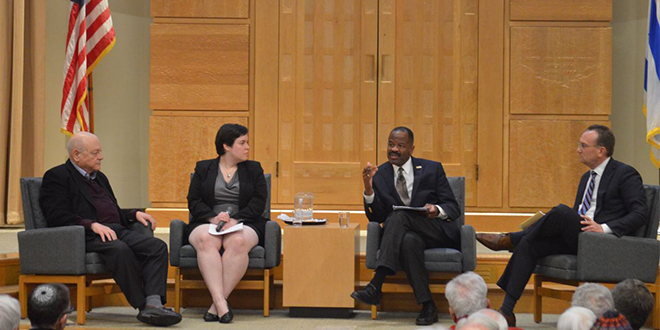03/17/2017
Experts Discuss Free Speech on Campus
- Share This Story
Experts discuss free speech on college campuses at CRC meeting
Article reprinted with permission from the Cleveland Jewish News.
By Amanda Koehn

Former president of the University of California Mark G. Yudof, from left, program officer at the Foundation for Individual Rights in Education Susan Kruth, Blake D. Morant, dean and the Robert Kramer research professor of law at The George Washington University Law School and CEO and publisher of the Cleveland Jewish News and president of the Cleveland Jewish Publication Company Kevin Adelstein, talk about free speech on college campuses at the Jewish Federation of Cleveland's Community Relations Committee Annual Meeting on March 15 at The Temple-Tifereth Israel in Beachwood. CJN photos/Amanda Koehn
Three panelists with expertise in higher education agreed that the right to free speech encompasses most controversial things said on college campuses, however, teaching the students how to engage in civil, persuasive discussions is the best bet for ensuring productive dialogue among those with opposing viewpoints.
The panelists made their points at the Jewish Federation of Cleveland’s Community Relations Committee Sidney Z. Vincent Memorial Lecture and annual meeting at The Temple-Tifereth Israel on March 15. More than 230 people attended the event, where the speakers considered topics like boycott, divestment and sanctions, free speech and controversial speakers on college campuses.
The speakers were Mark G. Yudof, former president of the University of California; Susan Kruth, program officer at the Foundation for Individual Rights in Education; and Blake D. Morant, dean and the Robert Kramer research professor of law at The George Washington University Law School in Washington, D.C. Each speaker had 10 minutes to talk and then moved into a panel discussion, moderated by Kevin S. Adelstein, CEO and publisher of the Cleveland Jewish News and president of the Cleveland Jewish Publication Company.
"In recent months, speakers from all backgrounds have been blocked from speaking on various college campuses,” Adelstein said. “Some of those have been met with very strong student-led protests. How has this phenomenon impacted students and the overall college environment?"
Yudof said not inviting controversial speakers has a “very bad impact” on the school’s environment. He referred to the incident at the University of California, Berkeley in February, when a speech by Milo Yiannopoulos, who was then senior editor at Breitbart News, was canceled after demonstrators set fires and threw objects in protest. Although many of the protesters who caused damage were thought not to be students, Yudof said that incidents like that cause universities to not invite controversial speakers because of the eventual backlash from people on both sides, not to mention damage expenses.
Kruth added that canceling controversial speakers "sends the wrong message to the students that this is how you win."
"But they haven't won anything, because they haven't persuaded anyone to any other ideas. And it's not like (the speaker) is gone, they are just going to go talk to different people."
Kruth said that students opposed to a campus speaker should attend the talk, listen carefully and then ask good questions to embarrass the speaker’s position.
“That is how you win,” she said.
Morant said he encourages students to engage in “civil discourse,” where the school creates an atmosphere where students express opinions with the goal of persuasion, rather than name calling or yelling. Adelstein asked if enforcing “civil discourse” restricts free speech, and Morant said it should not.
"That to me is not censorship, that is creating an atmosphere for exchange of ideas," Morant said. "Your are not telling people that they can't say something, it's getting people invested in being effective communicators."
When an audience question asked the panelists why college students may lack tolerance toward beliefs contrary to their own, Yudof speculated that it goes beyond common stereotypes that students belong to a pampered generation and that students today are “hurting.”
"They went through the Great Recession, which was difficult, they have uncertain prospects over the job market,” Yudof said, adding that Muslims and students of color face further challenges as well.
"I don't know what to do about it, but I think it's more subtle than just saying, 'there you go again, we indulge this new generation of students.’"
Although the crowd at the event was mostly well past the typical college age, the Cleveland Jewish News spoke with Alan and Joel Jaffe, college students from Solon on spring break.
Alan Jaffe, 20, said that as a junior at Carnegie Mellon University in Pittsburgh, he hasn’t experienced many incidents at his school related to free speech restrictions, however there is a fence on campus where students are only supposed to write one message a day. One day a student wrote “Trump” and other students crossed it out, violating the courtesy one message a day rule. Regardless, he said the speakers had interesting and diverse takes on the issues and would like to hear more solutions.
"It would have been interesting to hear some more ideas about how to really solve this problem,” Alan Jaffe said. “They gave a lot of opinions on what the law is, but not really any approaches on how to make sure people really are able to exercise their right to free speech."
His brother, Joel Jaffe, 18, a freshman at The Ohio State University in Columbus, saw some relevance between the event and the recent divestment campaign at his school, which was struck down by undergraduate government March 8.
"It was really unfair, like the wording (of the petition),”Joel Jaffe said. He added that Yudof was the only panelist who eagerly and directly addressed Israel and BDS.
“Maybe they didn't want to say anything too political," he said.


Comments